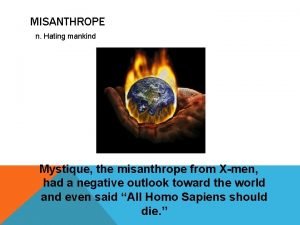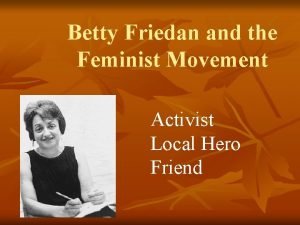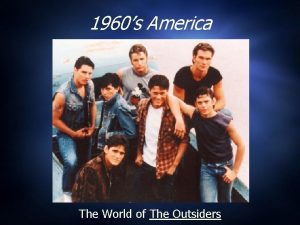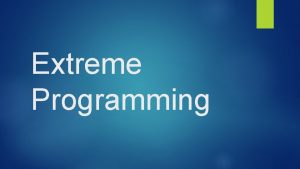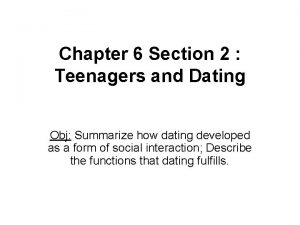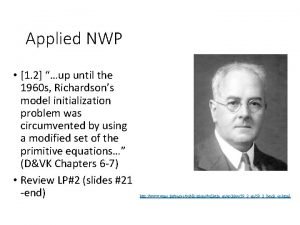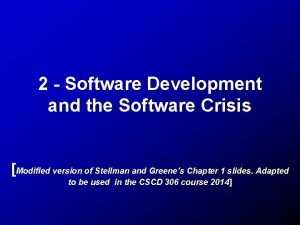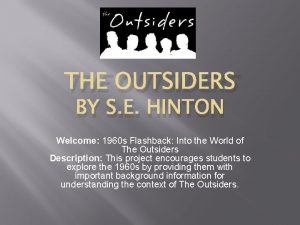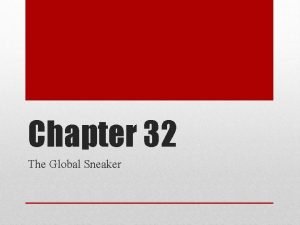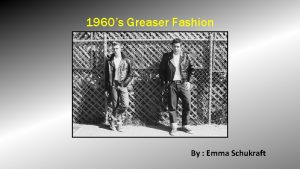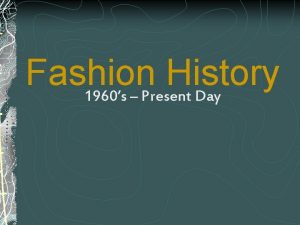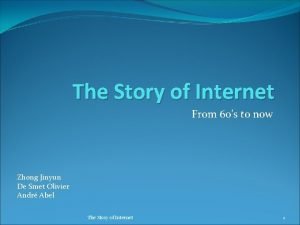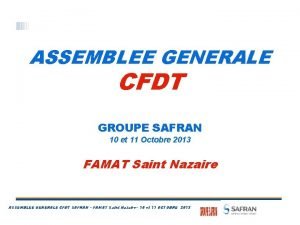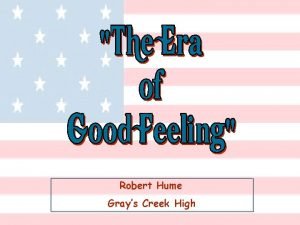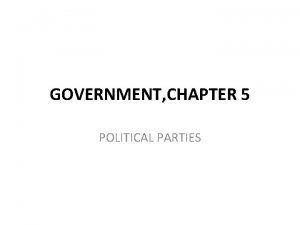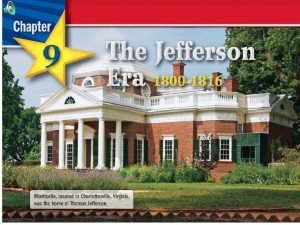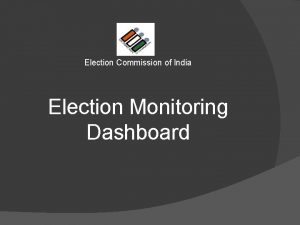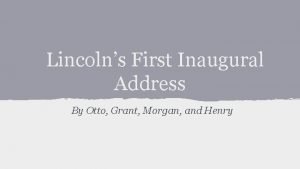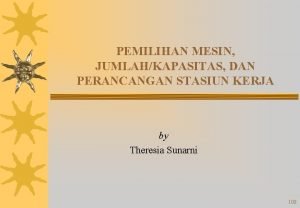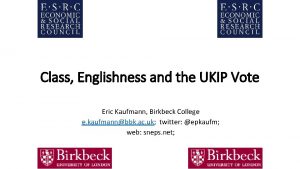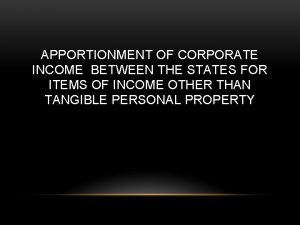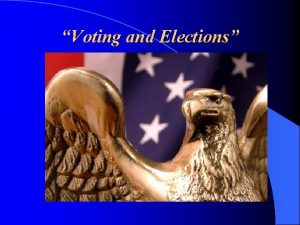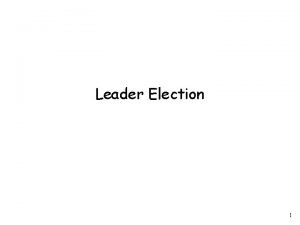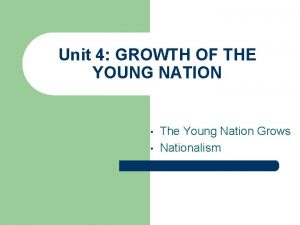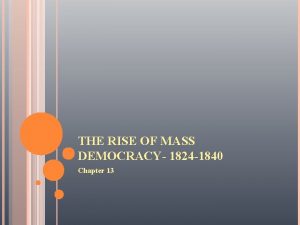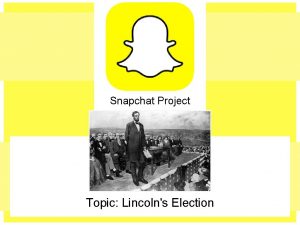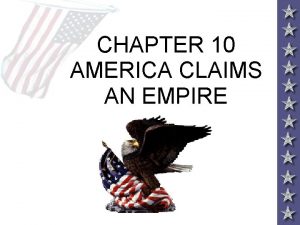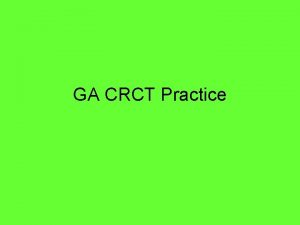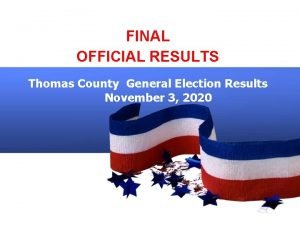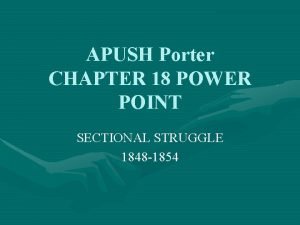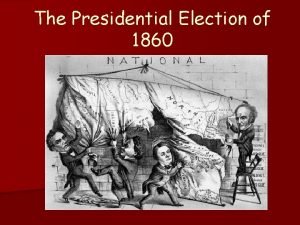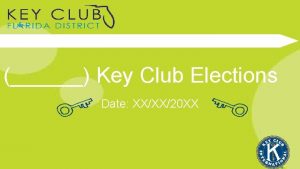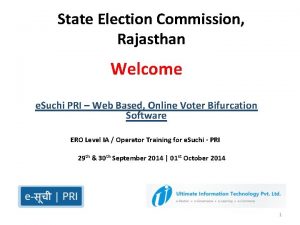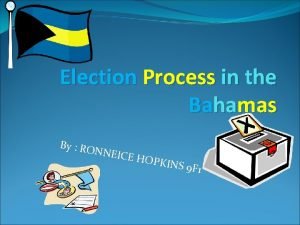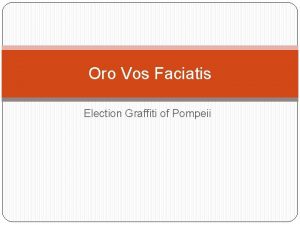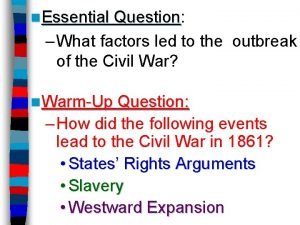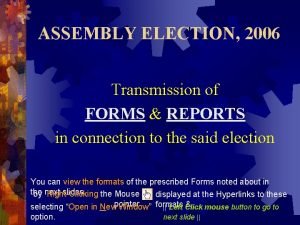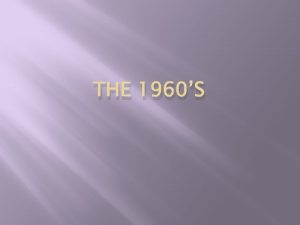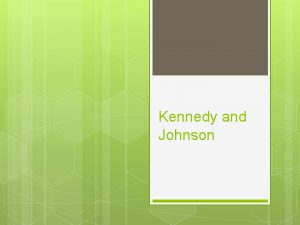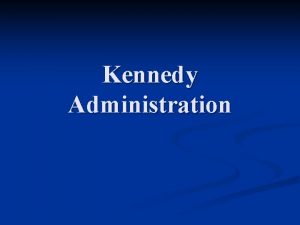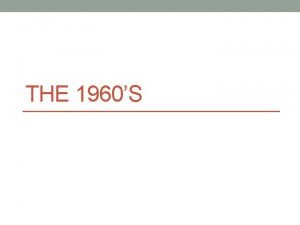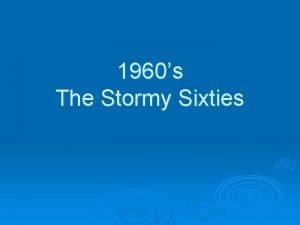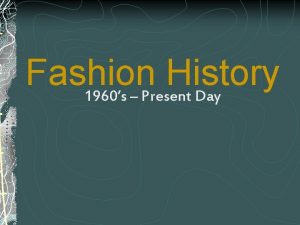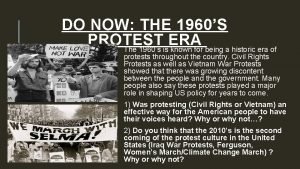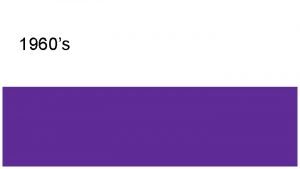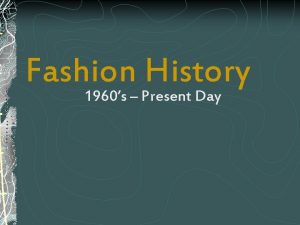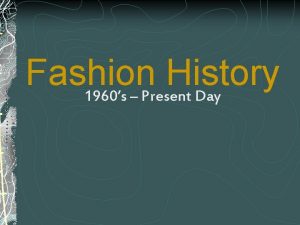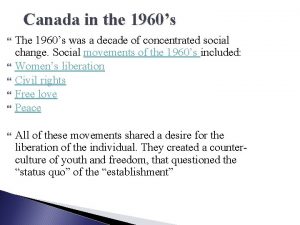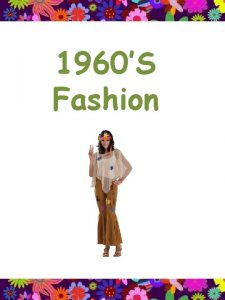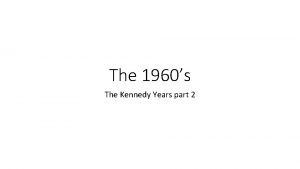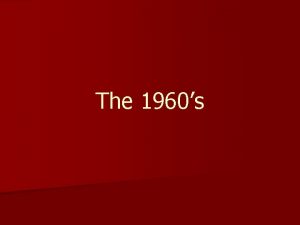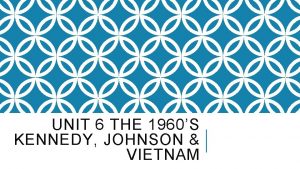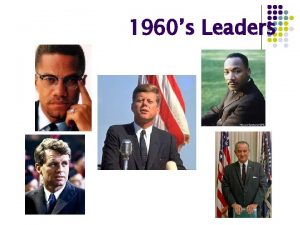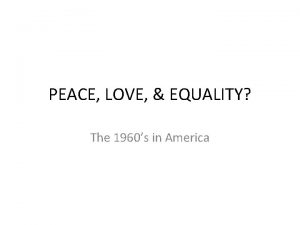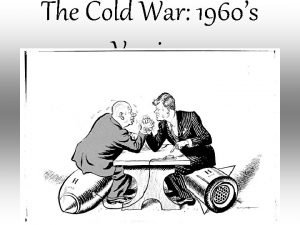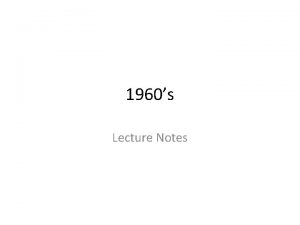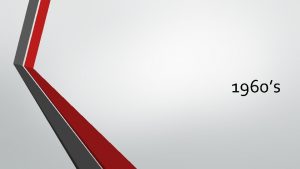The 1960s The Kennedy Mystique The Election of












































- Slides: 44

The 1960’s

The Kennedy Mystique

The Election of 1960 • Emphasis on youthful charisma • Personality more than issues or platform • New Frontier politics focused on “getting America moving again” • Campaigned on the issues such as: • Civil rights legislation • Health care for elderly • Aid to education • Urban renewal • Military & space programs • Containment of communism • Very famous Nixon/Kennedy TV Debates

Election 1960 • Kennedy’s youth, his emphasis on the future, and the first televised debates helped him to become the first catholic —and the youngest— President to be elected. • Just barely won popular vote. . .

Election of 1960

Kennedy & New Politics • First Catholic POTUS • Had difficulty mobilizing the public & congress to support his New Frontier agenda • Was able to push through raising the minimum wage & expanding social security. • Most of his agenda will get pushed through after his assassination with the help of LBJ and his Congressional connections. • http: //www. youtube. com/watch? v=BLmi. OEk 59 n 8&safety_mo de=true&persist_safety_mode=1&safe=active

Kennedy & the Cold War • Proposed a policy of flexible response: • Designed to deter direct attacks • Not every incident deserves the same response • Insisted on expanding the military – industrial complex & increase spending • Also adopted a new military doctrine of counterinsurgency • Green Berets (Special Forces) trained to repel and win guerrilla warfare • Would first be tested in Vietnam • Other Cold War Tactics • Peace Corps & Alliance for Progress

Kennedy’s First Test: Cuba & The Bay of Pigs • Castro/Background – Overthrew Cuban dictator Batista (1959) – Castro imposed communist policies; US declared an embargo on Cuba – Cuba looked to the Soviet Union for economic & military support – Kennedy & US were anxious about having communism so close to American borders (90 miles) – CIA (under Ike) were training Cuban refugees in an attempt to invade Cuba & overthrow Castro

• JFK learns of planned CIA invasion of communist Cuba during the campaign. • Advisors were divided about the plan, but Kennedy did NOT want to appear “soft” on communism—OK’d the mission. • Airstrikes were ineffective, the invaders were captured, and the connection to the U. S was exposed. . . in a word DISASTER!!! Objective not achieved pushed Castro closer to new Soviet leader, Nikita Krushchev increased U. S. -Soviet tensions

Another Blemish: The Berlin Wall(1961) • When U. S. refused to recognize East Germany as an independent nation, Khrushchev—also under pressure to be “tough” began construction of Berlin Wall between the two sides of the divided city.

Test #3: The Cuban Missile Crisis (1962) We went eyeball-to-eyeball with the Russians!

Cuban Missile Crisis (1962)

Cuban Missile Crisis (1962) • October 1962, American reconnaissance planes flying over Cuba photographed Soviet-built bases for ICBM’s • To confront the Soviet Union the US would impose a “quarantine on all offensive military equipment” intended for Cuba

Resolution • After negotiations it was agreed that if the US would not invade Cuba the Soviet Union would dismantle the missile bases • To strive for Peaceful Coexistence the US, Great Britain, and the Soviet Union agreed to stop testing nuclear weapons in the atmosphere, in space, and under water; underground testing would continue • A “hot line” was established between Washington and Moscow so that leaders could contact each other quickly during potential crises.

Ich bin ein Berliner! (1963) President Kennedy tells Berliners that the West is with them! Tensions were high in 1963—the pride and prestige of both Cold War rivals seems to be on the line. . .

Report to the American People on Civil Rights, 11 June 1963 • Activity: • LINK: http: //www. jfklibrary. org/Asset. Viewer/LH 8 F_0 Mzv 0 e 6 Ro 1 y. Em 74 Ng. aspx

The Kennedy Assassination • On November 22, 1963, in Dallas, Texas, President Kennedy was assassinated by Lee Harvey Oswald • Lyndon Johnson was sworn in as president • Sense that Americans had been robbed of a promising leader • The aura of “Camelot” over shadows Kennedy’s mixed record of accomplishments http: //www. youtube. com/watch? v=_x 51_44 Bk. WQ http: //www. youtube. com/watch? v=Pf. SXkf. V _mh. A


Lyndon B. Johnson • • • Won the 1964 election against Barry Goldwater in a landslide, and used his energy and genius for compromise to bring to fruition many of Kennedy’s stalled programs Johnson’s “Great Society”- fulfilled and surpassed the New Deal liberal agenda of the 1930’s He promptly pushed the passage of civil rights to appeal to a broad national audience • Often times used the “Johnson Treatment” to get his programs passed

The Johnson Treatment


LBJ and his Domestic Agenda: “The Great Society” • A New Deal liberal agenda • Pushed through some of JFK’s stalled programs and then began his own agenda • Included a variety of areas including: – Poverty – Urban renewal – Discrimination - Environment - Education - Consumer Advocacy Reading: LBJ & the Great Society http: //www. youtube. com/watch? v=x 4 Qc 1 VM 80 a. Q&safety_mode=true&persist_safety_mo de=1&safe=active

The Great Society & the “War on Poverty” • Wanted to put “an end to poverty in our time” • Expanded social programs and welfare programs including such things as food stamps Part of his plan for urban renewal Created Office of Economic Opportunity (Economic Opportunity Act -1964) and created such programs as: • • Head Start Job Corps Volunteers in Service to America Community Action Program Elementary & Secondary Education Act of 1965 – • $1 billion in federal funds to help impoverished inner-city kids • Higher Education Act – • first federal scholarships for college students • Federal health Insurance • Medicaid (poor) & Medicare (elderly) • • National Endowment for the Arts & Humanities Immigration Act of 1965 - abandoned the quota system of the 1920’s

The Great Society & Civil Rights • Johnson believed that reforms in Civil Rights way overdue. • Began to push for the passage of a number of civil rights acts and was successful in passing: • Civil Rights Act of 1964 – forced desegregation of public facilities throughout the south • Title VII – outlawed discrimination in employment based upon the basis of sex, religion, national origin or race. • Voting Rights Act of 1965 – suspended literacy tests and other measures used by southern states to prevent blacks from registering to vote • Twenty-fourth Amendment – outlawed federal poll tax

Decline of the Great Society • Concern began to arise about the rapid pace of Johnson’s reform • Midterm elections of 1966 brought more Republicans into the House & Senate • Programs still passed, but just under greater scrutiny. • Unfortunately money became an issue as the U. S. involvement in Vietnam grew even deeper. • U. S. was spending about $2. 5 billion a month on the war • Budetary issues arose – “We cannot have guns and butter: ” • Johnson, who was committed to stopping the spread of communism, chose guns

Vietnam War 1954 - 1975

The Johnson Doctrine • First initiated when Johnson sent troops to the Dominican Republic. • Declared that revolutions in Latin America are of concern to the U. S. especially “when the object is the establishment of a Communist dictatorship” • Johnson had now created a new form of American intervention known as the Johnson Doctrine

Early History of Vietnam • From 1800’s to WWII Vietnam was a French colony - imperialism • Government built, owned, and ran large plantations using the people and the resources with little care of the people themselves. • Looking only for economic benefit. • 1930’s, amongst a growing amount of unrest, the Communist Party was found with Ho Chi Minh as the leader • French responded by arresting Ho Chi Minh & sentenced him to death – he escaped • 1939 -1945: WWII breaks out, French shift their interest away from Vietnam & other colonies • 1941 Ho Chi Minh returns to Vietnam under the support of communist China & the Soviet Union • Ho Chi Minh, the Communist, & the Vietminh all want independence & self-determination • French refuse to give up their claim and attempt to move back in after WWII

Truman, Eisenhower, & the Southeast Asian Problem • • • Both POTUS mismanaged this issue at some point Both failed to understand the importance of gathering control of the Vietnam issue. By 1953 the US had settled for a stalemate in Korea – where we ready for another face off 1954 Eisenhower introduces the domino theory to the American public Ike stated that if the French did not regain control of Vietnam, communism would control it and would run wild over Southeast Asia 1954 French lost the battle at Dien Bien Phu and were forced to surrender and leave Vietnam. – Ho Chi Minh – North – capital Hanoi – Ngo Dinh Diem – South –capital Saigon • • • Once France lost the US felt it was now necessary to take a more aggressive action. Ike agreed to military support of Diem, in exchange for a stable government Didn’t work out so well with the formation of 2 things • A) Ho Chi Minh Trail • B) Vietcong • We are in deep now – can’t walk away


Kennedy & Vietnam • • • Kennedy inherited Eisenhower’s involvement in Vietnam; Kennedy viewed Vietnam in Cold War terms. Kennedy and his advisors wanted to try out the Green Berets in the Vietnamese jungles Giving up in Vietnam would weaken American’s credibility, the prevailing “domino theory” would cause other pro-American states to topple 11/1/1963 –Kennedy & the US supported an attempted military coup of Diems government The US was now engaged in a global war against communism

President Johnson’s War: Escalation in Vietnam 1963 -1968 • US wanted to show they were strong against communism • JFK had actually entertained the idea of pulling out of Vietnam, but LBJ would not & could not accept failure. • August 1964 a North Vietnamese gunboat, in a foggy area known as the Gulf of Tonkin “fired” upon a destroyer, the USS Maddox. • Johnson, extremely angry, went to Congress and the Gulf of Tonkin Resolution was passed – gave Johnson: “all necessary measures to repel any armed attack against the forces of the United States and prevent further aggression” • The Result: Operation Rolling Thunder – • a massive bombing campaign • Underestimated the N. Vietnamese willingness to fight • By 1968 more than 536, 000 American soldiers were in Vietnam

Figure 28. 2 U. S. Troops in Vietnam, 1960– 1973 This figure graphically tracks America's involvement in Vietnam. After Lyndon Johnson decided on escalation in 1964, troop levels jumped from 23, 300 to a peak of 543, 000 personnel in 1968. Under Richard Nixon's Vietnamization program, beginning in the summer of 1969, levels drastically declined; the last U. S. military forces left South Vietnam on March 29, 1973.

The Type of War • A. A Living Room War • Coffins coming home • Walter Cronkite & Credibility Gap • B. A Jungle War • C. A War of Attrition • General William Westmoreland • D. Un-Winnable? ? ?

1968: A Year of Tragedy in Vietnam • January 30, 1968 – Tet Offensive • • Truce called for Vietnamese New Year Funerals, coffins, and rifle oh my!!! Calculated Vietcong ambush all across the country Results: 1) American soldiers ambushed & killed 2) US Embassy in Saigon is attacked (5 killed) 3) Credibility Gap 4) Public Opinion strong sways 5) Ends Johnson’s Presidency

1968: A Year of Tragedy & Political Conflict at Home Tragedy: • Assassination of Martin Luther King Jr. – April 4 th • Assassination of Robert Kennedy – June 5 th Political Turmoil: • Tet offensive ended Johnson’s hopes for victory in Vietnam and in the 1968 election • March 31 st stuns nation announcing he would not seek reelection, but would search for peace before leaving office. • Bobby Kennedy became the new Dem. hopeful • Assassination of RFK causes chaos at the Dem Convention in Chicago; demonstrations and violence outside • Chicago Mayor Richard Daley calls out the police and it goes bad (violence, tear gas, clubs, beatings – all on TV) • Dem eventually nominate Hubert Humphrey whose platform supported continuing to fight in Vietnam • Richard Nixon (political reincarnation) get the Rep. majority stating that he had a plan to end the war


Election of 1968: Impact: a divided country Democrats Hubert Humphrey (P) Edmund Muskie (VP) Platform: continue fighting in Vietnam; it can be won Republicans Richard Nixon (P) Spiro Agnew (VP) Results: 42. 7% of vote Results: 43. 4% of vote Platform: “a plan to end the war” (not really)

Public Opinion on Vietnam Early Indications: • Television & Credibility Gap exposure • Cost of war began to rise , federal deficit grew, inflation out of control, Great Society greatly suffering. Student Activism draws attention • (SDS) Students for Democratic Society reject Cold War Ideology • New Left vs. Old Left • Univ. of California (Berkeley) – public protests, sit-ins, taking over admin buildings when protests are banned • Many protests were against the draft

The Counterculture • Overly romanticized in American history • “hippie” is born – youthful movement that glorified liberation from social structure. • Protest ideas and liberation became mixed up with a) music b) drugs c) sex • Students dropped out of school and “followed the way” • Birth of the “flower children • Summer of Love (1967) » “turn on, tune in, & drop out “ » 100, 000 young people converged on San Francisco, creating a phenomenon of cultural and political rebellion • Woodstock 1969

NIXON’S WAR • 1969 - The US bombed neutral Cambodia, through which North Vietnam had been transporting supplies and reinforcements, to convince them the US was serious about mutual troop withdrawal • Vietnamization- Nixon and Kissinger’s policy to replace American troops with South Vietnamese forces • Antiwar demonstrators believed the new policy protected American lives at the expense of the Vietnamese • After a large antiwar demonstration Nixon labeled the demonstrators as “bums; ” and states “North Vietnam cannot defeat or humiliate the US. Only Americans can do that. ” • 1970 - American incursion into Cambodia to destroy enemy havens there, it exposed Cambodia to a takeover by the Khmer Rouge • New York Times uncovered the secret invasion of Cambodia

Protest: Kent State • During an antiwar demonstration at Kent State University, National Guardsmen fired into the crowd killing 4 and wounding 11 • 450 colleges closed in protest

June 1970, Congressional opposition to the war intensified with the invasion of Cambodia Congress repealed the Gulf of Tonkin Resolution and cut off funding for operations in Cambodia 1971 - Lieutenant William L. Calley was court-martialed for atrocities committed in the village of My Lai Nixon promised to continue troop withdrawal, end the draft, and substitute an all-volunteer army by 1973

Nixon’s War Cont. • 1971 - as American troops withdrew, Communist forces stepped up their attacks on Laos, Cambodia, and South Vietnam • Nixon stepped up military actions with the “Christmas bombings” • The Paris Peace Accords were signed on January 27, 1973 • The South Vietnamese government soon fell to Communist forces, horrified Americans watched embassy personnel struggle to leave Saigon before North Vietnamese troops entered the city • April 29, 1975, Vietnam was reunited, and Saigon was renamed Ho Chi Minh City in honor of the Communist leader who had died in 1969
 Vexatious phlegm
Vexatious phlegm The feminine mystique
The feminine mystique Madras shirt 1960s outsiders
Madras shirt 1960s outsiders History of extreme programming
History of extreme programming In traditional dating patterns dating behavior
In traditional dating patterns dating behavior Up until the 1960s
Up until the 1960s Software crisis of 1960s
Software crisis of 1960s The outsiders backround
The outsiders backround Se hinton 1960s
Se hinton 1960s Where were sneakers manufactured until the 1960s
Where were sneakers manufactured until the 1960s Greasers style
Greasers style 1960s fashion history
1960s fashion history 1960s food
1960s food Internet 60s
Internet 60s Lincolns election
Lincolns election Vote.election-europe.com/fcpe-safran
Vote.election-europe.com/fcpe-safran Clarity election night reporting
Clarity election night reporting Election of 1824
Election of 1824 Economic protest parties definition
Economic protest parties definition 1796 election
1796 election The election of 1800 showed that
The election of 1800 showed that Eci dashboard
Eci dashboard Election of 1860 pie chart
Election of 1860 pie chart Strip seal in election
Strip seal in election Election machine
Election machine British election study
British election study Arizona multistate service provider election
Arizona multistate service provider election Brainpop voting
Brainpop voting Hirschberg sinclair algorithm
Hirschberg sinclair algorithm Main idea
Main idea George caleb bingham the county election
George caleb bingham the county election Election of 1836 & rise of mass democracy
Election of 1836 & rise of mass democracy Lincolns election date
Lincolns election date Election of 1896
Election of 1896 Which statement best describes the election of 2008?
Which statement best describes the election of 2008? Thomas county election results
Thomas county election results Chapter 18 apush
Chapter 18 apush Election of 1860 definition
Election of 1860 definition Key club caucus questions
Key club caucus questions Esuchi
Esuchi Election process in the bahamas
Election process in the bahamas 1932 presidential election
1932 presidential election Aqutium
Aqutium Abraham lincoln's election
Abraham lincoln's election Dcrc full form in election
Dcrc full form in election
